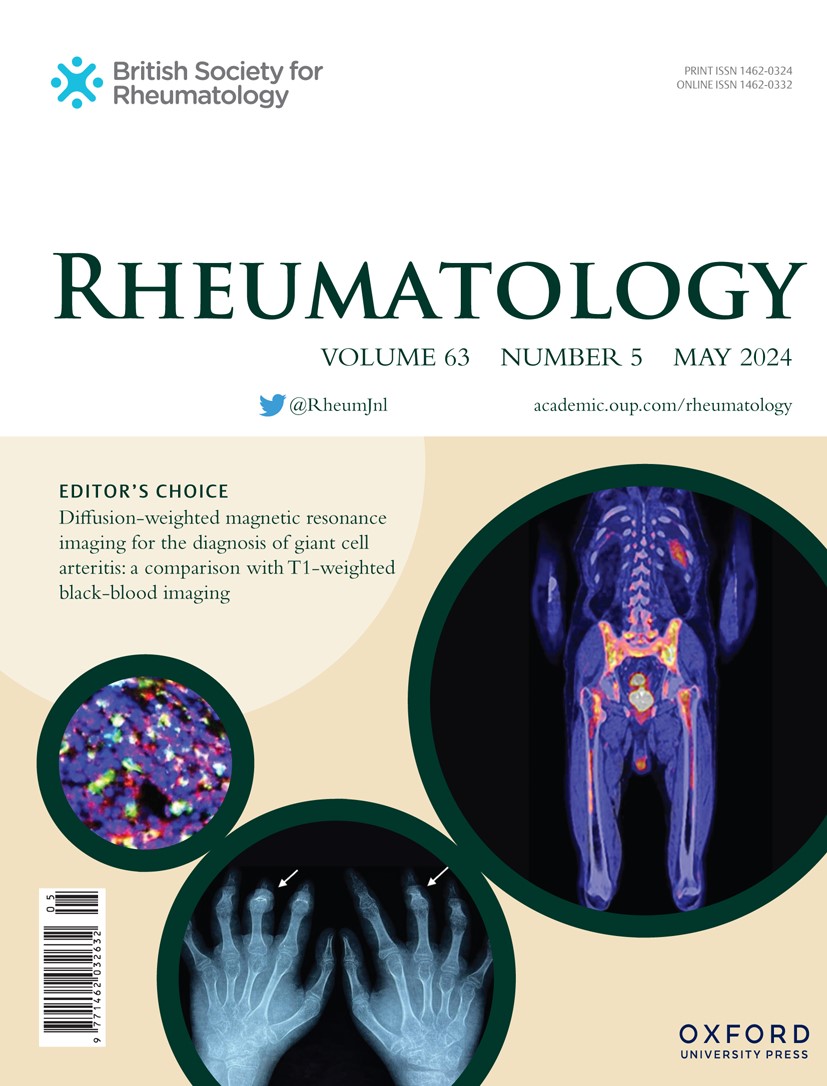系统性硬化症患者的疲劳程度及相关因素:对 2,385 名 SPIN 队列参与者进行的横断面研究
IF 4.4
2区 医学
Q1 RHEUMATOLOGY
引用次数: 0
摘要
目的 比较大型跨国系统性硬化症(SSc)队列与普通人群数据中的疲劳情况,并确定相关的社会人口、生活方式和 SSc 疾病因素。方法 硬皮病患者中心干预网络队列参与者完成了患者报告结果测量信息系统-29 v2.0疲劳域。T值与美国普通人群(平均值=50;标准差=10)进行了比较。采用多变量线性回归评估与社会人口学、生活方式和疾病相关变量的关联。结果 在 2385 名参与者中(平均年龄 54.9(SD = 12.6)岁,87% 为女性,38% 为弥漫性 SSc),平均疲劳 T 值为 54.6(SD = 11.0);438 人(18%)报告轻度疲劳,641 人(27%)报告中度疲劳,180 人(8%)报告重度疲劳。疲劳与社会人口学因素年龄(每年-0.10 分,[95% CI -0.14;-0.07])、男性性别(-1.67 分,[-2.96;-0.37])、未婚状态(0.97 分[0.04;1.89])和国家(参考美国;法国-2.35分[-3.48;-1.21]和英国2.38分[0.80;3.97]),以及生活方式因素吸烟(4.16分[2.52;5.80])、饮酒(每周每次饮酒-0.18分[-0.28;-0.07])和体重指数(每单位0.34分[0.27;0.42])。疲劳与疾病相关因素胃肠道受累(4.21 分 [2.99; 5.43])、数字溃疡(1.51 分 [0.25; 2.77])、中度小关节挛缩(1.41 分 [0.13; 2.69])、类风湿性关节炎(4.34 分 [2.37-6.31] )和斯约格伦综合征(1.89 分 [0.23; 3.55])有关。当疼痛被纳入模型时,其相关性很大(2.19 分 [2.03; 2.34]),间质性肺病也与之相关(1.21 分 [0.42; 2.00])。结论 SSc 患者的疲劳评分远高于普通人群,并与多种疾病因素有关,包括胃肠道受累、多种疼痛性疾病表现和肺部受累。本文章由计算机程序翻译,如有差异,请以英文原文为准。
Fatigue levels and associated factors in systemic sclerosis: a cross-sectional study of 2,385 SPIN Cohort participants
Objectives To compare fatigue in a large multinational systemic sclerosis (SSc) cohort to general population data and identify associated sociodemographic, lifestyle and SSc disease factors. Methods Scleroderma Patient-centered Intervention Network Cohort participants completed the Patient-Reported Outcomes Measurement Information System-29 v2.0 fatigue domain. T-scores were compared with the USA general population (mean = 50; SD = 10). Multivariable linear regression was used to assess associations with sociodemographic, lifestyle, and disease-related variables. Results Among 2,385 participants (mean age 54.9 (SD = 12.6) years, 87% female, 38% diffuse SSc), mean fatigue T-score was 54.6 (SD = 11.0); 438 (18%) reported mild fatigue, 641 (27%) moderate, and 180 (8%) severe fatigue. Fatigue was independently associated with sociodemographic factors age (-0.10 points per year, [95% CI -0.14;-0.07]), male sex (-1.67 points, [-2.96;-0.37]), non-married status (0.97 points [0.04; 1.89]), and country (reference USA; France -2.35 points [-3.48;-1.21] and UK 2.38 points [0.80; 3.97]), and lifestyle factors smoking (4.16 points [2.52; 5.80]), alcohol consumption (-0.18 points per drink per week [-0.28;-0.07]), and body-mass index (0.34 points per unit [0.27; 0.42]). Fatigue was associated with disease-related factors gastrointestinal involvement (4.21 points [2.99; 5.43]), digital ulcers (1.51 points, [0.25; 2.77]), moderate small joints contractures (1.41 points [0.13; 2.69]), rheumatoid arthritis (4.34 points [2.37–6.31]) and Sjögren’s syndrome (1.89 points [0.23; 3.55]). When pain was included in the model, its association was large (2.19 points [2.03; 2.34]) and interstitial lung disease was also associated (1.21 points [0.42; 2.00]). Conclusions In people with SSc, fatigue scores were substantially higher than the general population and associated with multiple disease factors including gastrointestinal involvement, several painful disease manifestations, and lung involvement.
求助全文
通过发布文献求助,成功后即可免费获取论文全文。
去求助
来源期刊

Rheumatology
医学-风湿病学
CiteScore
9.40
自引率
7.30%
发文量
1091
审稿时长
2 months
期刊介绍:
Rheumatology strives to support research and discovery by publishing the highest quality original scientific papers with a focus on basic, clinical and translational research. The journal’s subject areas cover a wide range of paediatric and adult rheumatological conditions from an international perspective. It is an official journal of the British Society for Rheumatology, published by Oxford University Press.
Rheumatology publishes original articles, reviews, editorials, guidelines, concise reports, meta-analyses, original case reports, clinical vignettes, letters and matters arising from published material. The journal takes pride in serving the global rheumatology community, with a focus on high societal impact in the form of podcasts, videos and extended social media presence, and utilizing metrics such as Altmetric. Keep up to date by following the journal on Twitter @RheumJnl.
 求助内容:
求助内容: 应助结果提醒方式:
应助结果提醒方式:


